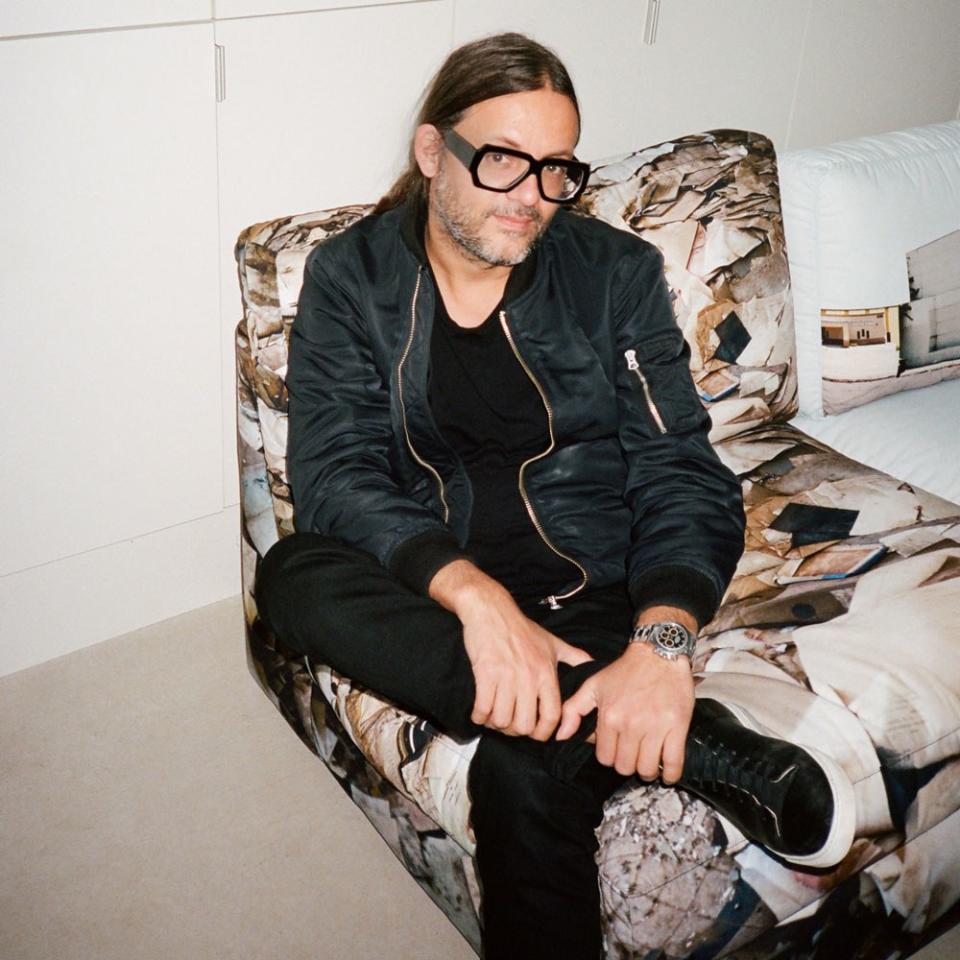Parley for the Oceans Founder Cyrill Gutsch Believes Fashion Can Lead the Way to a Healthier Planet
In the face of dismal climate change headlines and a string of natural disasters, it’s easy to feel a little helpless. If you work in the fashion industry, it’s even easier. Fashion tends to be pretty woke—creatives aren’t exactly shy about voicing their political views, and it’s assumed that most of us are tree huggers these days—but who needs fashion when 250,000 tons of plastic are floating around the ocean? And tiny bits of plastic are making their way to remote, uninhabited beaches? And entire marine species are being wiped out? Compounded with the fact that fashion is part of the problem (it’s the second-most polluting industry in the world), it might just send you on a guilt spiral.
You’d be forgiven for feeling the way, but you’d also be sort of wrong. Because according to Cyrill Gutsch, founder of Parley for the Oceans (the organization dedicated to preserving the oceans and eliminating plastic from the planet), fashion isn’t the enemy, nor is it a frivolous distraction from the “real” fight against climate change. In fact, fashion could make all the difference. “Fashion has the power to change people’s minds in a very quick way,” he says. “It has a big role to play in environmentalism, because it [speaks to] people on an emotional and instinctual level. It speaks to desire and beauty, and allows us to convey this very serious message about the fragility of the planet in a way that isn’t preachy. It’s positive. And it’s fast.”
How’s that for inspiration? Designers and fashion insiders who attend the Fashion Awards in partnership with Swarovski in London on December 10 will be similarly inspired when Gutsch accepts the Special Recognition Award for Innovation; Parley is the second company to receive it, following Stella McCartney, which took home the inaugural award in 2017. In a release, the British Fashion Council wrote: “Parley will be honored for its commitment to highlighting the devastating effects of plastic on our environment and through collaborations, working with designers to reinvent the way in which products can be made and designed in order to turn a problem into an opportunity, to protect our oceans.”
Sustainable fashion designers and activists around the world will be cheered to see Gutsch and Parley get that kind of recognition (Miuccia Prada will also be honored that night, and award nominees include Alessandro Michele and Victoria Beckham). “It’s very encouraging,” Gutsch says. “It’s a very high honor, of course, and it’s very meaningful in the fashion world. But we didn’t create a collection—we created technologies, new materials, and strategies, and we’re at the beginning [of what we want to achieve]. So the award is more of an encouragement, and we feel backed by the fashion community. That feeling of support is new to us—for the past six years, it wasn’t so easy to translate our vision into the everyday of a fashion house or a label. This was the first year, really, that we felt that support, and [felt] welcomed and understood by fashion.”

Stella McCartney and Adidas have recently collaborated with Parley on sneakers, yoga gear, and accessories made of Parley Ocean Plastic, its game-changing fiber created from recycled plastic recovered from oceans and rivers. Adidas has pledged to stop using virgin plastic by 2024 and will incorporate 100 percent Ocean Plastic, and McCartney has used Ocean Plastic in her ready-to-wear and accessories collections. Other luxury brands have yet to join her—but here’s hoping that changes in 2019. Gutsch says he was contacted by upwards of 1,000 brands that want to collaborate on similar projects this year. “In the beginning, most designers weren’t ready for Parley,” he says. “They didn’t have the time to work on new materials, but now we’re talking to all of the big designers. They don’t want to be part of the destruction anymore.”
The first step designers can take—whether they’re a Parley partner or not—is to simply eliminate plastic from their collections, from packaging to synthetic fibers like polyester. (Did you know that when you wash polyester, tiny plastic particles are released into the water and end up in the ocean?) They can replace it with Ocean Plastic, or make the switch to natural fibers, or support the high-tech fabric innovations Parley is working on. Cleaning up the oceans and recycling plastic debris is just one arm of Parley’s mission; the other is to replace plastic entirely with new materials. “You can grow materials from mushrooms, proteins, algae,” Gutsch explains. “In the next four to 12 years, you’ll see a huge transformation when it comes to materials. The true challenge will be to get them into the supply chain and make sure they can compete with, or outperform, existing materials. People will have to pay a little more for them, and that’s a big role Parley has to play—studying the supply chain and finding ways to justify those additional costs, or finding ways to boost technology and get funding for it,” he continues. “I really believe we’re starting a new economy. It’s like when we switched from analog to digital, and what happened during the digital revolution—our way of communicating changed, and our access to knowledge [became easier]. That’s what is happening with materials.”
Those materials will take some time, but Ocean Plastic has made enormous strides already. “We can match pretty much any material with Ocean Plastic [fibers],” Gutsch says. “Right now, there’s no excuse for a brand to use virgin plastic. Plastic has become the ‘face’ of this global environmental crisis. I don’t see why they can’t all convert to recycled materials—it’s the least they can do.” Plus, if influential brands are using Ocean Plastic or mushroom-grown leather or other high-tech fabrics in their collections, and those clothes are worn by influential celebrities and fashion icons, and there’s an uptick in demand for those pieces . . . well, you get the idea. “Fashion has so much influence on other industries, like automotive design and electronics,” Gutsch says. “And everything is so visual right now, with Instagram and social media [bringing] greater importance to aesthetics. We’re educated about aesthetics as never before, and fashion is an influence you can’t escape. It’s the only power that can really reach every layer of society.”
Gutsch is quick to point out that the upcoming award is an “invitation for the fashion industry to join the Parley movement,” not an opportunity to pause to bask in the achievement. “We have to remind ourselves that we really haven’t achieved anything at this point,” he says. “To ‘wake up’ is one thing, but the destruction [of our planet] is still speeding up—we didn’t stop it yet. This is just the beginning, and in 12 years, we have to say we’ve succeeded. We’ll look back and say, that was the beginning of something big, the beginning of a material revolution. I think our biggest achievement has been building a bridge between environmentalists and corporations—it isn’t a time to fight. Even if you’re talking to someone who doesn’t share your point of view, the solution is in that conversation. We want to create a network that brings people together who can actually solve these problems.”
As for next year, Gutsch mentions Parley’s 100 Islands Project, a partnership with Corona to protect 100 islands around the world from plastic pollution. The initial goal was to complete the project by 2020, but they already reached 100 islands in 2018, and are on track to clean up 200 islands next year. There are more designer collaborations to come, too, though Gutsch is selective. “We only want to work with companies that are willing to go all the way [with their sustainable efforts], not just with one item or for a PR stunt,” he says. “Sometimes the process of figuring out how to transform a brand can take two years—we dive deep into their supply chain and eliminate substances like plastic and chemicals, but it takes patience. They have to think long-term.” For brands who want to start a little smaller, Parley is launching a platform that will invite anyone in the fashion and luxury space to experiment with its new materials.
“This award is the perfect preparation going into 2019,” Gutsch adds. “I see lots of change coming, and collections and products turning into symbols of change and innovation . . . I think the time is right for the whole industry to become part of the resistance. I really believe in the transformative and revolutionary power of fashion.”


